
|
Greatest Courtroom Dramas 1940s |
(chronological by film title) Introduction | 1920s-1930s | 1940s | 1950s | 1960s | 1970s | 1980s | 1990s | 2000s | 2010s |
(chronological by title) |
||
| Film Title/Year/Director/Length/Studio, Academy Awards, Brief Description | ||
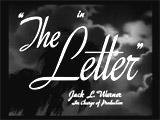
|
The Letter (1940) On the grounds of a Malayan rubber plantation one evening, bored and restless wife Leslie Crosbie (Bette Davis) shot and point-blank killed old family friend Geoffrey Hammond (David Newell) on the porch of her home with her husband's gun. She explained to her husband Robert (Herbert Marshall) (who was away at the time of the murder) and their hired respected lawyer Howard Joyce (James Stephenson), with cold calculation and manipulation, that it was self-defense to protect her honor. Her husband faithfully believed her. She claimed that Hammond, who was married to an Eurasian - Mrs. Hammond (Gale Sondergaard), had tried to rape her. She was to stand trial in Singapore for murder. [Note: In fact, she killed him because as her lover, he threatened to leave her to take another partner.] During the proceedings, clerk Ong Chi Seng (Victor Sen Yung) presented Joyce with a copy of an incriminating letter written from Leslie to Geoffrey on the day of the shooting, desperately asking to see him. The letter was in the possession of Hammond's widow, who blackmailed them by offering to sell it for $10,000 (Robert's savings). Leslie tearfully admitted her affair with Hammond. The letter had to be retrieved personally in a dramatic scene. Verdict: During the subsequent court trial, Leslie was found innocent of murder charges, because the incriminating evidence wasn't produced. Stephenson told the jury it was "a simple, uncomplicated case" - after she again claimed she shot Hammond in self-defense. However, on the night of the acquittal, Leslie suffered a fateful retribution in the conclusion, when she was knifed in the dark by Mrs. Hammond. According to the Hays Code, she had to pay and be punished for her indiscretion. |
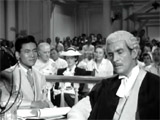
|
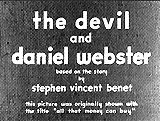
|
The Devil and Daniel Webster (1941)
(aka All That Money Can Buy) This cautionary moral tale was based on Stephen Vincent Benét's Faustian short story. In 1840, poor, 27 year-old Cross Corners, New Hampshire farmer Jabez Stone (James Craig), married for two years to Mary (Anne Shirley), was down on his luck. His family and mother Ma Stone (Jane Darwell) faced eviction and were in debt to local loan shark Miser Stevens (John Qualen). He sold his soul to the jolly but ruthless Mr. Scratch (Walter Huston), aka The Devil or Satan (Mephistopheles). For seven years, Jabez would become financially prosperous and wealthy with lots of good luck, after which the Devil would take his invisible soul. Jabez found Hessian gold coins under the floor of his barn and immediately paid off his debts to Stevens, and became richer and richer (with the townsfolk owing him money), but also became greedy and hard-hearted. Also, Scratch sent bewitching and alluring housemaid/nanny/temptress Belle (Simone Simon), driving off his wife and newborn son. When 7 years was up, Jabez was given the option of giving up his son to save his soul - but he refused. He enlisted the aid of local hero and famous orator/politician Daniel Webster (Edward Arnold) to defend him - with a jury trial. Verdict: In the film's conclusion, the jury of the "damned" summoned by the Devil was composed of infamous cutthroats, brigands and traitors in American history, such as Benedict Arnold, who had previously sold their souls also. The judge was Justice John Hathorne (W.B. Warner) of the Salem witch trials, who refused cross-examination, and denied disqualification of the prejudiced jury. With eloquent oratory in the final moments, Webster gave an impassioned closing argument, which persuaded the jury and the court to turn against Mr. Scratch, destroy the contract, and have mercy on Jabez. |
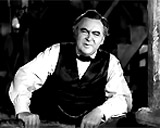
|
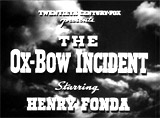
|
The Ox-Bow Incident (1943) The western film's setting was in and around the small Nevada town of Bridger's Wells, in 1885. The thought-provoking film, based upon Walter Van Tilburg Clark's novel, was basically a somber morality-play set in the West regarding vigilante justice. The noirish film was the inspiration for Sidney Lumet's courtroom drama 12 Angry Men (1957). Two drifters, Gil Carter (Henry Fonda) and Art Croft (Harry Morgan), rode into town as news arrived that local rancher Larry Kincaid had been allegedly murdered by cattle rustlers. Immediately, a posse was formed to locate and punish the gunmen, without a fair trial. Storekeeper Arthur Davies (Harry Davenport) ineffectually implored that they cautiously not take any extreme actions until the Sheriff Risley (Willard Robertson) was notified about the alleged murder. Judge Daniel Tyler (Matt Briggs) was also powerless. With the Sheriff away, Deputy Sheriff "Butch" Mapes (Dick Rich) deputized the entire blood-thirsty lynch mob, led by pompous, vocal, and power-hungry Major Tetley (Frank Conroy), an ex-Confederate officer who took the law into his own hands. Tetley was joined by iron-willed, heartless, cackling, blood-thirsty, robust Jenny "Ma" Grier (Jane Darwell). The cold-blooded posse came upon three sleeping men with 50 head of cattle. Verdict: The lynch mob conducted a quick trial without due process. Rancher Donald Martin (Dana Andrews) claimed he bought the herd from Kincaid but had no bill of sale. It was assumed he was a cattle rustler. The second man was a senile, "feeble-minded" old man (Francis Ford), while the third was stoic, defiant Mexican Juan Martinez (Anthony Quinn) who at first feigned not speaking English. Martinez had Kincaid's gun, which he said he found on the road. Carter and Croft unsuccessfully attempted to prevent the dawn lynching of the three innocent men for alleged murder and cattle rustling (the vote was 21/28 in favor of hanging). Shortly later, the group met up with the shocked Sheriff, who had just apprehended the real rustlers, and revealed that Kincaid was alive. In the film's epilogue set in the town's saloon, Carter read the farewell words of Martin in a letter (a strong indictment of vigilante lawlessness) that he had written to his wife before the lynching. A collection was taken for Martin's widow, and the two drifters promised to deliver the letter. |

|
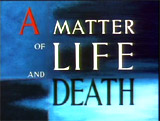
|
A Matter of Life and Death (1946,
UK) (aka Stairway to Heaven) This romantic fantasy opened with a radio distress call from squadron leader pilot Peter D. Carter (David Niven) delivered within his burning British RAF bomber plane. Before leaping without a parachute, he fell in love with his American, Boston-born WAC radio operator June (Kim Hunter) as he told her he was about to crash: "No, I'm not gonna land - undercarriage is gone. Inner port's on fire. I'm bailing out presently, I'm bailing out... Yes June, I'm bailing out. I'm bailing out, but there's a catch. I've got no parachute....Hello, June, don't be afraid. It's quite simple. We've had it and I'd rather jump than fry. After the first thousand feet, what's the difference? I shan't know anything, anyway. I hope I haven't frightened you....I'll be a ghost and come and see you! You're not frightened of ghosts are you?...I was lucky to get you, June. Can't be helped about the parachute. I'll have wings soon anyway, big white ones... I'm signing off now, June. Goodbye. Goodbye, June." After landing back on Earth, he woke up - still alive. He met June on an English beach as she was bicycling home. Peter was alive because there was a discrepancy reported in heaven's celestial court: ("91,716 invoiced, 91,715 checked in") - as Conductor 71 (a guillotined French Revolution aristocrat), an Other World escort, explained the problem: ("Everything was calculated except for the accursed fog! The pilot jumped, he got lost in the fog, I missed him"). Peter ascended a stairway into the heavens lined with statues of famous people (Lincoln, Plato, Richelieu, Solomon), as Peter and Conductor 71 rode up - the statues represented potential counsels for Peter for his upcoming trial, but Peter balked at all of them: ("It sounds a grand idea to have all these great men to choose from, but what do they know of our problems today?"). While on the operating table (facing surgery for a brain injury), hovering between life and death - he dreamt that his spirit was on trial, with God (Abraham Sofaer) serving as Judge, Carter's recently-deceased best friend Dr. Frank Reeves (Roger Livesey) as his defense counsel, and Abraham Farlan (Raymond Massey) (the first American casualty of the Revolutionary War) as the prosecutor, about whether he should be claimed or survive. The three-day trial was held in an enormous heavenly courtroom (filled with soldiers who lost their lives in war) revealed in a long pull-back shot as a gigantic arena - and then as the center of a swirling galaxy in space (an effects shot combining miniatures and artwork). Verdict: In the final scene, a tearful June took Carter's place on the staircase to the Other World to die for him. The two stared at each other (with a close-up of the tearful June as she said 'goodbye darling'), but then with a jolt, the stairs stopped, culminating with the lovers' embrace and the approval of Carter's appeal. Reeves stated: "Nothing is stronger than the law in the universe, but on Earth, nothing is stronger than love." June's self-sacrifice led to Peter's winning his appeal to live. She ran down the stairs to embrace Carter, after having his appeal granted and he was given a long life by the court. Words of Sir Walter Scott were intoned by God/the Judge: ("Members of the jury, as Sir Walter Scott is always saying, 'In peace, love tunes the shepherd's reed; in war, he mounts the warrior's steed; in halls, in gay attire is seen; in hamlets, dances on the green. Love rules the court, the camp, the grove, and men below and saints above. For Love is heaven, and heaven is Love'"). |
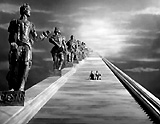 Stairway to Heaven 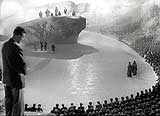 Heavenly Court - Peter on Trial 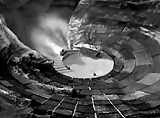  A Spiraling Galaxy 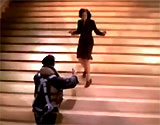
|

|
Boomerang! (1947) This semi-documentary crime film was based upon the true story of the 1924 unsolved murder of an Episcopal priest in Connecticut. The elderly, beloved and kindly priest Father George Lambert (Wryley Birch) in Bridgeport, CT was murdered (by gunshot) during his regular evening walk at a street-corner by an unidentified killer. Police Chief Harold F. 'Robbie' Robinson (Lee J. Cobb) faced tremendous political pressure to quickly find the suspect. There were seven witnesses to the shooting, but the killer's face wasn't conclusively seen, and there were no other clues. The Morning Record (and its ace political reporter Dave Woods (Sam Levene)) stirred up trouble by blaming the current administration for being soft on crime. Out-of-town WWII veteran and unemployed drifter John Waldron (Arthur Kennedy) was soon targeted as the suspected murderer (he was arrested in Cleveland, Ohio), although he vehemently denied being involved. Forensics evidence showed that the bullet came from his gun. He was exhaustively questioned by the police chief and lead detective Lieutenant White (Karl Malden) for two days, and gave in by signing a confession - under duress. State's District Attorney Henry Harvey (Dana Andrews), a potential candidate for governor, was assigned to try and prove Waldron's innocence - obvious, the suspect was a victim of prejudgment. Verdict: During the court hearing, Harvey destroyed the prosecution's case and exonerated Waldron. He reenacted the crime seven times - proving that none of the unreliable eyewitnesses could have seen the killer from where they were positioned on the street. He also demonstrated that the intense grilling from police was unfairly brutal and that the confession was coerced. He also submitted five expert ballistics reports that disproved the bullet came from Waldron's gun. In a dramatic Russian Roulette-styled challenge, Harvey dared Waldron's loaded gun to be fired into the back of his own head - the gun wouldn't fire (revealing that it had a broken malfunctioning pin and couldn't be fired). Waldron was freed, and although the case was reopened, the real killer was never caught. [In a scene much earlier in the film, it was surmised that Lambert's killer might have been his mentally-unstable assistant pastor.] |

|
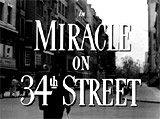
|
Miracle on 34th Street (1947) In this charming and sentimental Christmas movie (a comedy/fantasy), divorced workaholic Doris Walker (Maureen O'Hara), the parade-manager of Macy's Department Store, hired white-bearded Kris Kringle (Edmund Gwenn) as Santa Claus, beginning with an appearance on a Thanksgiving Day parade float. Although Kringle as the toy department's Santa sometimes endorsed competing department stores, he became extremely popular. Problems also arose when Kringle claimed he was the real Santa Claus and the store's incompetent psychologist Mr. Sawyer (Porter Hall) ruled that Kringle was delusional and dangerous. Doris' doubting and cynical second grade daughter Susan (Natalie Wood) also thought Kringle was only a fairy-tale. Kringle's work application revealed he was a nursing home resident in Great Neck, Long Island, where the resident physician Dr. Pierce (James Seay) also claimed that 'Santa' was delusional but not dangerous to himself or others. However, upon examination at Bellevue Hospital, after Kringle deliberately failed his tests, it was ruled that he was insane and needed to be committed. Doris' love interest and next-door neighbor Fred Gailey (John Payne), a handsome bachelor lawyer, proposed to defend Kris in an 'insanity hearing.' Verdict: Before Kringle was committed to Bellevue, Fred convinced Judge Henry Harper (Gene Lockhart) to hold the hearing. State's District Attorney Thomas Mara (Jerome Cowan) was convinced he had won the case when Kris decisively declared that he was Santa Claus. Fred needed to prove his case that it was wrong to vilify Santa Claus, and at the same time acceptable to have faith in the red-suited character and believe in the power of imagination (and the Christmas spirit). On his side was the idea that it would cause a backlash to rule against Kris Kringle. Fred produced thousands of post office letters addressed to Santa Claus. His argument was that the US government agency's recognition of these letters was "positive proof" of Santa Claus' existence. The judge agreed and he dismissed the case, and Kringle was released, and freed from being committed. |
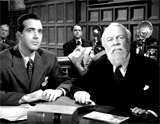
|
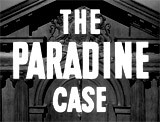
|
The Paradine Case (1947) Based upon the 1933 novel by Robert Smythe Hichens, and noted as Alfred Hitchcock's final film for producer David Selznick. In the year 1946 in England, beautiful and exotic young wife Maddalena Anna Paradine (Italian actress Alida Valli) was accused of poisoning her blind, elderly and wealthy husband Colonel Richard Paradine, a retired WWI hero. However, it was unclear whether it was suicide or murder, or whether the hostile Canadian valet Andre LaTour (Louis Jourdan) was involved. Was Mrs. Paradine being falsely accused? Successful married London barrister/counselor Anthony Keane (Gregory Peck) was hired by the family's solicitor Sir Simon Flaquer (Charles Coburn) to take the case to defend the accused murderess (and possible femme fatale). Not long after, Keane fell in love with her, neglecting his 11 year-old marriage to his kind and loyal wife Gay (Ann Todd). Gay realized her straying husband's passionate relationship to his attractive yet enigmatic client, but supported him so that he wouldn't be lost to her forever if she was convicted. The trial was presided over by sarcastic, bullying Judge Lord Thomas Horfield (Charles Laughton). Verdict: Blinded and infatuated by love, defense lawyer Tony Keane tried to put the blame on a scapegoat - the Colonel's valet LaTour, although he vehemently denied it. However, under cross-examination in a dramatic scene, LaTour revealed that he was committing adultery with Mrs. Paradine, and some of his conflicting testimoney raised doubts about whether he assisted the Colonel in committing suicide. After testifying to his own guilt about the affair with Anna (but not about poisoning the Colonel), LaTour killed himself. Then, Mrs. Paradine admitted that she had initiated the affair, although the valet remained loyal to the Colonel. When the Colonel learned of the sexual indiscretions of LaTour, however, the valet was discharged. Then, Mrs. Paradine revealed that she had poisoned her husband with a poisoned wine glass. In the final scene, she then denounced the disreputable Keane for falling in love with her, and for destroying her real love, LaTour due to his strategy to condemn and blame LaTour during the trial. Keane confessed his major limitations and his devastation over the revelations, and withdrew from the court. He was soon reconciled with his conciliatory and supportive wife Gay. For her crime, Mrs. Paradine was sentenced to execution (by hanging): ("The Paradine woman will be hanged after three clear Sundays"). |
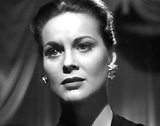
Mrs. Anna Paradine (Alida Valli) 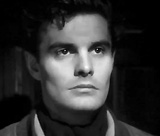 Colonel's Valet Andre LaTour (Louis Jourdan) 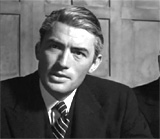 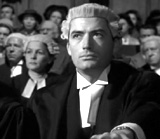 Barrister Anthony "Tony" Keane |
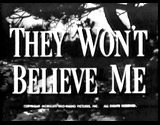
|
They Won't Believe Me (1947) In this film noirish melodrama about adultery, philandering playboy Lawrence Ballentine (Robert Young) was on trial for the brutal murder of Verna Carlson (Susan Hayward). Before flashbacks to tell the defendant's unbelievable life-story (an 'unreliable witness' account), Ballentine's attorney Cahill (Frank Ferguson) claimed that his stockbroker client was innocent. Almost the entire film consisted of Ballentine's uninterrupted flashbacked story. Although married for five years to rich and loving wife Greta (Rita Johnson), he planned to take a train to run off to Montreal with tempting mistress Janice Bell (Jane Greer), a NYC magazine writer and one of Greta's friends. Greta tried to keep their marriage going by buying her husband's loyalty. She rented a Beverly Hills, California house, and purchased an interest in a stock brokerage firm. After about six months there, he again left Greta for sexy, femme fatale LA secretary Verna Carlson, working in his own firm. Greta thought she could still hold onto her husband by selling his interest in the partnership, and moving away with him to an isolated mountain ranch. Unhappy with the arrangement, Lawrence promised Verna that he would go to Reno to get a quickie divorce from his wife, and then they could begin their new life together. As they were driving to Reno, a truck collided with their car. Verna was horribly killed and burned in the wreckage, while Ballentine survived with a serious concussion. Ballentine realized that he could easily claim that it was Greta who died, so he concocted a complicated scheme to inherit his wife's fortune. He would carry out the deception by agreeing that Greta (not Verna) had died in the accident, then murder Greta, hide her body, and acquire her money. When he arrived at Greta's remote ranch, he found her already dead, presumably distraught over the divorce-breakup, and at the bottom of a cliff where she had fallen accidentally after an equestrian accident - or committed suicide. (However, there was one other real possibility: Had he pushed her, and then subconsciously felt guilty for murdering her?) To avoid suspicion, Ballentine left Greta's body to decompose in the river, and carried through with the rest of his scheme. Unfortunately for him, the police located Greta's remains, but thought it was Verna's body. Ballentine was charged with murder, after the police wrongly theorized that Larry killed Verna because she was blackmailing him over their affair. Verdict: The story - told by Ballentine as the sole defense witness - returned to the courtroom where the jurors filed in with their verdict. Fearing the worst (was he actually guilty of a crime?), Ballentine attempted a desperate suicidal escape through an open courtroom window - when he was shot and killed. In the surprise ending, the jury's foreman read the verdict - not guilty! |

|
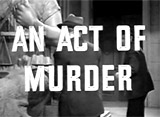
|
An Act of Murder (1948) (aka Live
Today for Tomorrow, or I Stand Accused) The film's screenplay was adapted from Ernst Lothar's novel "The Mills of God" - it was a poignant, film-noirish melodrama about a controversial topic. Strict and unyielding small town Pennsylvania Judge Calvin Cooke (Fredric March) was known as "Old Man Maximum" for his reputation of following "the letter of the law" and delivering harsh sentences. He was devoted to wife Catherine (or "Cathy") (Florence Eldridge) and their volatile law student daughter Ellie Cooke (Geraldine Brooks). However, he did not approve of the relationship Ellie was having with young defense attorney David Douglas (Edmond O'Brien), who interpreted the law more liberally. Cooke's wife had increasing symptoms of blurred vision and frequent severe headaches. The family physician Doctor Walter Morrison (Stanley Ridges) diagnosed a terminal illness: a fatal brain tumor. He kept the news secret from Cathy but not from Calvin. During a second honeymoon trip (a weekend outing) with Calvin, Cathy discovered her prescription for toxic Demarine pain pills and the doctor's description of her illness (hidden in her husband's suitcase), but did not reveal what she had found. During the trip home by car, after stopping at a roadside gas station garage and cafe, Cathy collapsed. The Cooke's car crashed through an embankment on a mountainous road - and Cathy was killed, while Calvin was injured (he required a cane to walk). Afterwards, he implored the DA to indict him for murdering his wife - he claimed he intentionally drove off the road during the raging storm to cause the crash - and set up the mercy killing (or euthanasia) to relieve her suffering. The film's tagline summarized the judicial proceedings in the film: "MERCY or MURDER? Can you condemn this man?" Verdict: Acting as his own lawyer, Calvin pleaded guilty of murder before Judge Ogden (John McIntire), who appointed (under Cooke's protest) David Douglas as Cooke's lawyer at the sentencing hearing. Douglas ordered an autopsy - the results revealed that Cathy had died of a pain-killer drug overdose before the crash. Witnesses corroborated her story that she filled the prescription at the hotel with a pharmacist, and took the pills at the cafe before the crash. The judge dismissed the charges, ruling that Cooke was legally innocent, but his moral intentions were guilty. He was saved by the unforgiving legal code that declared she was already dead. Cooke had a change of heart about his judicial attitudes, promising to be more lenient, compassionate, and respectful of moral circumstances and personal situations during trials - he was finally in agreement with Douglas and his daughter. |
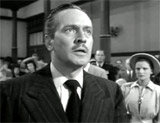
|
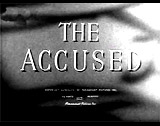
|
The Accused (1949) A film noir based upon June Truesdell's 1947 novel, "Be Still, My Love." The dramatic psychological crime thriller opened with psychology professor Dr. Wilma Tuttle (Loretta Young), a prim and proper teacher at a small Southern California LA college, at a Pacific Coast Highway beach in Malibu one evening. After hitching a ride home with a trucker Jack Hunter (Mickey Knox), Wilma slept restlessly and in the morning, she recalled - in flashback - entirely what had occurred the previous day. She had been fending off the flirtatious romantic advances of one of her students, handsome Bill Perry (Douglas Dick), a "bad boy" who came from a dysfunctional family. As they parked next to an isolated beach cliff, he changed into a bathing suit and then became sexually aroused (he called her a "little firecracker") - and attempted to rape her. She resisted, picked up a tire iron, and unintentionally beat him to death. To cover up the crime, she tossed his body over the cliff into the ocean, making it appear that Bill was diving into the water from cliff's edge. The overwhelmingly-distraught Wilma was anxious and guilt-ridden about the murder. She learned from Bill's guardian, lawyer Warren Ford (Robert Cummings), that Susan Duval (Suzanne Dalbert), a foreign exchange student in the same class who had unrequited love for Bill, claimed (falsely) that he had impregnated her, in order to get his attention. When Bill's body was found, skilled investigating detective Lt. Ted Dorgan (Wendell Corey) concluded that it was murder, and Susan became the prime suspect. To allay suspicion, Wilma began to date Warren (and soon, they became engaged), and she was fortunate that the trucker couldn't identify her. Forensics lab technician Dr. Romley (Sam Jaffe) concluded accurately that the killer had struck Bill on the head with a lethal blow, and then faked Bill's drowning. Wilma was having frequent anxiety attacks and outbursts. Detective Dorgan suspected that Wilma was the murderer - he knew she had copied a letter to Bill (that she had put on her door, but the janitor had thrown away) about cancelling a date to see him, in order to help establish her innocence. He also knew that Bill's last words were that he was going to meet with a "cyclothymiac cutie" - a phrase taken from one of Wilma's exam questions on personality about a chronic mood disorder. Wilma knew that Bill had described her as a repressed, prudish female in the exam, and she feared that she would be connected to Bill's death. Verdict: With a subpoena to appear in court, Wilma confessed to the killing after re-enacting the murder scene. She was arrested, and Warren elected to defend her - arguing that the crime was committed in self-defense. In his closing argument, he convincingly argued that fearful Wilma's only crime was the cover-up. Detective Dorgan realized that the circumstances of the case, defended by the love-struck lawyer, would fully exonerate her. |
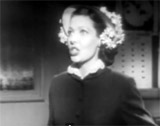
|
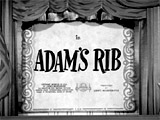
|
Adam's Rib (1949) A great, sophisticated, battle-of-the-sexes comedy, one of Hollywood's greatest sophisticated comedy classics. It was about husband-and-wife lawyers in the upper middle-class who took opposite sides of a front-page court case. Often rated as the best pairing of the nine films of the legendary screen team of Tracy and Hepburn - it was their sixth film together. In the film's opening, 'dumb blonde' Doris Attinger (Judy Holliday in her debut major film role) followed her philandering, two-timing husband Warren (Tom Ewell) when he was meeting with mistress Beryl Caighn (Jean Hagen) in a Manhattan apartment. The wronged Brooklyn housewife, a real bombshell, vengefully shot and wounded him, and was charged with attempted murder. Chauvinistic Asst. District Attorney Adam Bonner (Spencer Tracy) was the prosecutor, while his savvy wife Amanda Bonner (Katharine Hepburn) was Doris' defense attorney. Verdict: Adam was angered that his wife Amanda volunteered to defend Doris (pro bono) with feminist, women's rights arguments for seeking revenge - upsetting sexist double standards. She claimed that Doris had the same right (an "unwritten law") as a man to shoot a spouse when caught in adultery. During the trial, Beryl testified that Warren was at the apartment to sell her an insurance policy, and that he never touched her. Doris testified that she wanted to save their marriage and family (they had three children) - she wanted to frighten Warren, not injure him or Beryl. To bolster her case (although irrelevant), Amanda called three successful female witnesses to demonstrate equality of the sexes - her own political agenda. There were personal tensions on the homefront each evening between Amanda and Adam, and eventually Adam moved out. His closing argument was weak, due to the fact that Amanda interrupted him with frequent objections to his claims that Doris was a criminal. The jury acquitted Doris. At film's end, Adam finally and conclusively admitted the profound differences between males and females to Amanda: "Vive la difference." |
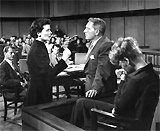
|
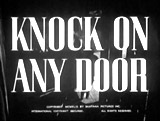
|
Knock on Any Door (1949) A 'social problem' drama based upon the best-selling book by Willard Motley. Nick "Pretty Boy" Romano (John Derek), a mal-adjusted and frequent lawbreaker, was charged with the crime of robbery in the 380 Bar, and the cold-blooded murder of police Officer Dan Hawkins (Thomas Sully) during flight. Prominent Attorney Andrew Morton (Humphrey Bogart) reluctantly agreed to defend Romano, while the District Attorney was Kerman (George Macready). Judge Drake (Barry Kelly) presided. Verdict: The DA argued that Romano was a black-hearted murderer that deserved to be executed. Morton, who grew up with the same hardship conditions as Romano, counter-argued with a simplistic defense plea that emphasized the evil of the slums, where Romano had been raised. In flashback, it was shown that years earlier, Morton's law firm had improperly defended Nick's innocent, Italian immigrant grocer father, who was sent to prison and died there. Romano's disadvantaged family was forced to move to the slums, where young disenfranchised Nick lived in poverty, was sent to a reform school, gambled himself into debt, met the wrong people, and joined a violent criminal gang. After Nick's wife Emma (Allene Roberts) became pregnant, he fled, and when he returned, he found that she had committed suicide (by asphyxiation in a gas oven). He turned to robbery and held up a train station. At the conclusion of his opening statements, slightly guilt-ridden Morton stated that Romano was not the murderer. DA Kerman summoned some unreliable, uncredible eyewitness to the stand who claimed they had seen Nick: (1) victimized 380 Bar bartender Carl Swanson (Vince Barnett), (2) homeless bum Kid Fingers Carnahan (Jimmy Conlin). Their testimonies were discredited by Morton. An accusatory statement by Juan Rodriguez (Pepe Hern) was obtained under duress - Rodriguez was coerced by being threatened with deportation by police. Two of Morton's witnesses provided Nick with an alibi - they were drinking beer at the time of the crime. Under fierce cross-examination on the stand, Nick (who shouldn't have been allowed to testify) caved to pressure by Kerman (who screamed "murderer" at him), especially when he was accused of causing his wife Emma's suicide. Romano broke down and confessed to the robbery and murder. In the final moments of the trial, liberal-minded attorney Morton emotionally pleaded for leniency and mercy from the jury regarding Nick's admission of guilt, arguing that his social upbringing and failures of the justice system had caused his life of crime, but his pleas were unsuccessful. Nick was sentenced to death (by electric chair) by the Judge. |

|